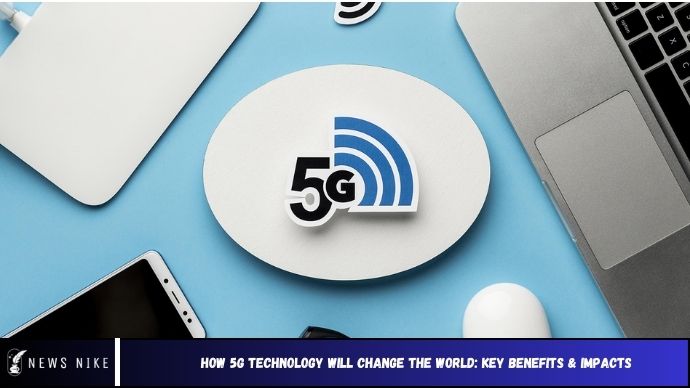How 5G Technology Will Change The World: Key Benefits & Impacts In a world where connectivity is king, 5G is the next big leap forward. Imagine downloading an entire HD movie in a few seconds or experiencing real-time, high-definition virtual reality without any lag. That’s the promise of 5G technology. With its potential to enable faster speeds, ultra-reliable connections, and massive device interconnectivity, 5G is set to transform industries, improve quality of life, and create new opportunities. In this article, we’ll dive into the world of 5G, exploring how it will impact everything from healthcare to transportation, entertainment, and beyond.
What is 5G Technology?
5G, or the fifth generation of wireless technology, is a significant leap from its predecessor, 4G. With speeds up to 100 times faster than 4G and significantly lower latency, 5G will enable faster data transfer and smoother connectivity for millions of devices worldwide. It also offers more reliable connections and improved capacity, which is essential as more devices become connected to the internet.
Key Benefits of 5G:
- Faster Speeds: Download speeds of up to 10Gbps, enabling faster streaming and real-time experiences.
- Lower Latency: Near-instantaneous communication with minimal delay, crucial for time-sensitive applications.
- Higher Capacity: Connecting more devices simultaneously without losing performance.
How Will 5G Change the World?
1. Enhanced Consumer Experiences
With 5G, everyday digital experiences will become faster and more immersive. Downloading high-definition videos, playing cloud-based video games, and engaging in virtual reality (VR) or augmented reality (AR) will be seamless, creating a richer, more interactive experience for consumers.
- Example: VR and AR applications will be more responsive, allowing for immersive gaming, virtual tourism, and advanced healthcare simulations.
2. Smart Cities and Infrastructure
5G will enable the rise of smart cities, where everything from traffic management to energy consumption is monitored and optimized in real-time. With faster and more reliable networks, smart sensors can improve everything from waste management to public safety.
- Example: Traffic lights that adjust based on real-time traffic conditions and smart streetlights that save energy by dimming when no one is nearby.
3. Autonomous Vehicles and Transportation
One of the most exciting applications of 5G is in autonomous vehicles. With low latency and high-speed data transfer, 5G networks will allow self-driving cars to communicate with each other and their environment more effectively, improving safety and efficiency on the roads.
- Example: Self-driving cars will be able to instantly react to road conditions, other vehicles, and pedestrians, making transportation safer and more efficient.
4. Healthcare Advancements
5G has the potential to revolutionize healthcare by enabling remote surgeries, telemedicine, and real-time patient monitoring. Doctors will be able to perform procedures from miles away, and wearable devices will continuously track health data, allowing for better prevention and personalized treatment.
- Example: Surgeons could operate on patients remotely, using robotic systems controlled in real-time via 5G networks.
5. Industry 4.0 and IoT Growth
5G will accelerate the adoption of the Internet of Things (IoT), connecting everything from factory machines to home appliances. In industries, 5G will enable faster communication between devices, improving operational efficiency, predictive maintenance, and automation.
- Example: In manufacturing, machines can communicate with each other and with operators instantly, leading to smarter factories and reduced downtime.
The Economic Impact of 5G
The global economic impact of 5G technology is expected to be massive. According to a report by IHS Markit, 5G is projected to contribute $13.2 trillion to the global economy by 2035, creating millions of jobs and opportunities across various sectors. From enabling new industries to enhancing existing ones, the widespread rollout of 5G will be a driving force for economic growth.
Potential Challenges of 5G
While 5G holds great promise, its deployment comes with some challenges:
- Infrastructure Costs: Building the required 5G infrastructure (such as small cells and fiber networks) is expensive and time-consuming.
- Privacy and Security: With more devices connected to the internet, the risk of cyberattacks increases, making data security a critical concern.
- Regulation and Policy: Governments must create frameworks to manage 5G spectrum, ensuring equitable access and preventing monopolies.
Conclusion
5G technology is not just a faster internet connection; it’s a game-changer that will shape the future of communication, business, and daily life. From empowering industries with automation to transforming healthcare and transportation, 5G will create a world of faster, smarter, and more connected experiences. While challenges remain, the potential benefits of 5G are immense, making it one of the most anticipated technological advancements of the next decade. Embrace the future and prepare for a world powered by 5G.
Frequently Asked Questions (FAQs)
1. What is 5G technology?
5G is the fifth generation of wireless technology, offering faster speeds, lower latency, and greater capacity compared to previous networks.
2. How will 5G impact consumers?
5G will enhance user experiences by providing faster downloads, improved streaming, and more immersive technologies like AR and VR.
3. What role will 5G play in healthcare?
5G will enable remote surgeries, telemedicine, and real-time health monitoring, improving patient care and healthcare access.
4. Will 5G affect autonomous vehicles?
Yes, 5G will allow self-driving cars to communicate instantly with each other and their surroundings, improving road safety and traffic efficiency.
5. What is the economic impact of 5G?
5G is expected to contribute $13.2 trillion to the global economy by 2035, creating millions of jobs and fostering new industries.
6. What challenges does 5G face?
Challenges include high infrastructure costs, privacy concerns, and the need for new regulations and policies to manage its deployment.

